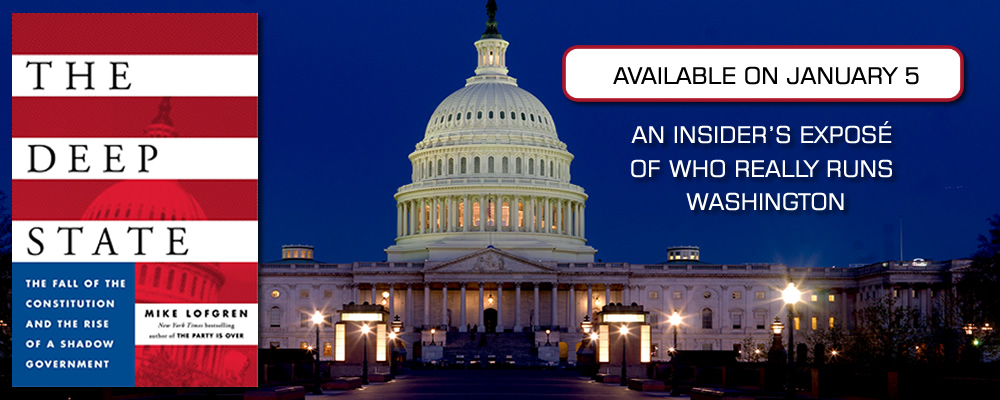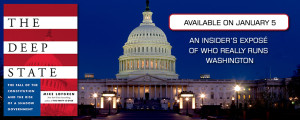 In early 2014 Mike Lofgren’s searing expose of the nation’s Deep State revealed a landscape where our officials, elected and otherwise, collude to protect and serve powerful, vested interests from government to commerce. Two years later, he’s expanded it into a book, which just came out a couple of weeks ago. It’s well worth reading.
In early 2014 Mike Lofgren’s searing expose of the nation’s Deep State revealed a landscape where our officials, elected and otherwise, collude to protect and serve powerful, vested interests from government to commerce. Two years later, he’s expanded it into a book, which just came out a couple of weeks ago. It’s well worth reading.
Lofgren’s wasn’t a new theory—Eisenhower warned us about the military-industrial complex in the late Fifties, and I remember discussing the same themes in the Sixties. But Lofgren claims the present day hybrid of corporate, Wall Street, and national security interests is all about “sucking” money out of the system and consolidating economic and political control.
What’s surprising today, moreover, is that most of the players in the Deep State no longer conduct their business in shadowy government and corporate corridors. Many of their tactics and activities are right out in the public arena, and some are even praised. I recommend this interview for a summary of what the Deep State is all about.
In the upcoming release of JUMP CUT, my first Ellie Foreman thriller in ten years, I deal with part of Lofgren’s thesis; I even mention the essay specifically. Which made me wonder what the reaction to Lofgren’s essay has been two years later, now that it’s a book. Is it still news to anyone? Is it disturbing that the whispers with which it was once discussed are now in the open? Does anyone still grapple with the power thought to be vested in these institutions that run the world vs. the relative helplessness of everyone else?
What America thinks about the Deep State
After the essay was published, The Huffington Post reproduced the article in its entirety. Crooks and Liars did the same. Daily Kos said:
“When Bill Moyers covers a subject one may always anticipate that it will be journalism at its most consistently sublime, at least in comparison to the work of virtually everyone else that claims any affiliation with this country’s mainstream media.
What have other experts and people in positions of authority had to say about it? Shortly afterwards, a flurry of feedback was posted to the Bill Moyers site. It’s a chilling read.
Military Historian Andrew Bacevich was disturbed by Washington’s tacit consensus, saying:
“Modified consensus, superseding progressivism, dominated the American political scene for several decades during the latter half of the 20th century. Although the Cold War has long since ended, this emphasis on an expansive, militarized foreign policy persists.”
But Lee Fang, who writes for The Intercept , saw a glimmer of hope:
“Lofgren …notes (sic) that the Deep State relies not just on money and access, but predictability. The chance of democratic revival will not come from the political processes taught in Civics 101. Rather, it may come from some uncertain interruption in the future or from a rot caused by the parasitic nature of the Deep State itself.”
Director of the National Lawyers Guild, Heidi Boghosian went in hard and critical on mass surveillance, (which is at the heart of JUMP CUT, btw) saying:
“The term Deep State aptly conveys how the private security industry has melded with government. It is soldered by plutocracy, perpetual war, reduction of industrial capacity, US exceptionalism and political malfunction. Lofgren is a credible and welcome interpreter of how these factors combine to exert control over us.”
Who’s In — Who’s Out
But exactly which corporations, government organizations, and people are part of the Deep State? Do they ever change? Do new, more powerful agents join? Are others “blackballed?” I remember years ago, being told in theatrical whispers about the Bilderberg Group, The Trilateral Commission and The Council of Foreign Relations. They were the core of the shadow government, intent on creating the “New World Order” through regular meetings, which were sometimes sweetened through “fun” gatherings like the annual meetings at California’s Bohemian Grove.
Recently though, a group called the Continuity of Government has joined the Deep State. Its members have written and even implemented (during 9-11) the rules for preserving the government in the event of a cataclysmic event. It’s called the Doomsday protocol.
In the area of privacy and snooping and the erosion of our civil rights, the ascendance of the NSA and other government organizations, helped along by the data collection prowess of Google, Facebook, Apple, and the telecom companies, have introduced (or perhaps a better word is “promoted”) these new members within The Deep State. And the rise of private contractors—reportedly over 70% of intelligence operations are performed by private citizens—has shifted the power within the intelligence community, and intelligence is a pillar of the Deep State.
As scary as that is, what’s most disturbing, at least to me, is the notion of perpetual war, which Lofgren says is embedded into Deep State thinking. Peace is bad for the economy, so we must always be at war. Think about it. Since WW2, has there been any era of peace? Apparently, this philosophy was codified by Deep Staters in the 1960’s in The Report From Iron Mountain.
For a quick reference, do read this article, especially toward the end. It’s fascinating, especially since most of the videos that accompanied the text have been “removed.”
The Deep State’s Future
Given that it’s now common knowledge, I wonder if we’re suffering from Deep State saturation. Because we’re able to identify it, label it, even discuss it openly, does that mean it’s somehow become less threatening, less creepy?
Not likely. In fact, a British friend tells me her search for reactions to the Bill Moyers piece returns a warning from Google: “Some results may have been removed under data protection law in Europe.”It’s clear that someone, somewhere is still actively trying to limit the essay’s spread and impact.
And, in a seemingly perfect Catch-22, Google UK says this:
“The recent ruling by the Court of Justice of the European Union has profound consequences for search engines in Europe. The court found that certain users have the right to ask search engines like Google to remove results for queries that include the person’s name. To qualify, the results shown would need to be inadequate, irrelevant, no longer relevant, or excessive….We will then assess your case – please note that this may take some time because we have already received many such requests.
Which means that if you fill out the form, the Deep State will now have YOUR name, email, and how to track you. Where are you, Yossarian?
